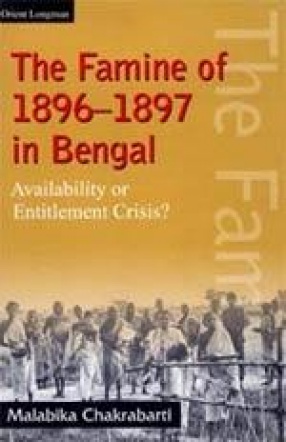The book is a focused treatment of a famine both as an ‘event’ and a ‘process’. It is a close-up of a peasant economy in the throes of a crisis which temporarily eroded the value-system determining the normal pattern of entitlements. An investigation of the socio-economic, ecological and cultural determinants of the famine helps evolve a coherent framework. The emphasis is on the distinctive problems of the various economic regions, most notably the tribal belts. Chakrabarti applies Amartya Sen’s theory of exchange entitlements to a nineteenth century famine situation in Bengal, and finds that a market-based entitlement failure precipitating severe famine conditions, "even without receiving any impulse from food production", has little relevance here. Though the book underlines the predicament of the subalterns, the famine is not seen from the viewpoint of any specific group or community. The focus is, rather, on the phenomenon of famine in its totality – on the agony and trauma of a peasant society thrown out of gear in an abnormal situation, and the crisis of identities that ensued.
The Famine of 1896-1897 in Bengal: Availability or Entitlement Crisis?
$31.50
$35.00
In stock
Free & Quick Delivery Worldwide
All orders amounting to US$ 50 or more qualify for Free Delivery Worldwide. For orders less than US$ 50, we offer Standard Delivery at $14 per book.
ABOUT THE AUTHOR Malabika Chakrabarti
Malabika Chakrabarti has done extensive research on the socio-economic history of Bengal in the nineteenth century and has published in leading journals on the subject. She has a brilliant academic career and taught at the Rabindra Bharati University, Kolkata. She is currently engaged in post-doctoral work and freelance writing.
reviews
0 in total
Review by Anonymous
Be the first to review “The Famine of 1896-1897 in Bengal: Availability or Entitlement Crisis?” Cancel reply
You must be logged in to post a review.
Bibliographic information
Title
The Famine of 1896-1897 in Bengal: Availability or Entitlement Crisis?
Author
Edition
1st ed.
Publisher
ISBN
8125023895
Length
x+541p., Tables; Maps; Appendices; Glossary; Bibliography; Index; 23cm.
Subjects
similar bookssee more
The Descent of the Lyre
$24.30
$27.00





There are no reviews yet.